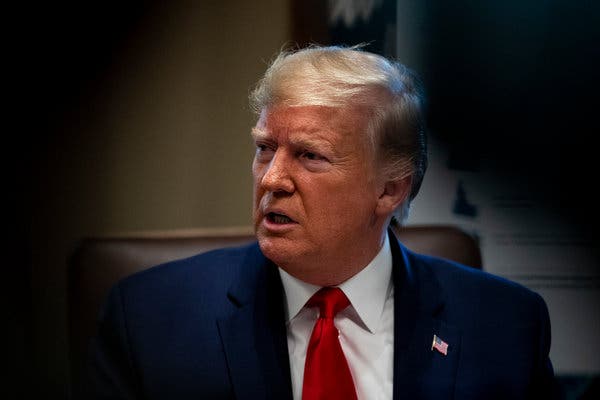WASHINGTON — The Trump administration is divided over how aggressively to restrict China’s access to United States technology as it looks for ways to protect national security without undercutting American industry.
President Trump and many of his top advisers have identified China’s technological ambitions as a national security threat and want to limit the type of American technology that can be sold overseas. But a plan to do just that has encountered stiff resistance from some in the administration, who argue that imposing too many constraints could backfire and undermine American industry.
The debate underscores the extent to which Mr. Trump’s trade fight with China has left many issues unresolved. The president announced plans this month to sign a “Phase 1” trade agreement that would require China to buy more farm products and agree to some technology protections in exchange for a pause in new American tariffs.
The agreement, which has yet to be signed, lowered tensions between the two nations. But concerns about Beijing’s economic ambitions remain, posing an even greater challenge as the United States considers what steps to take to ensure American companies dominate the next generation of technologies.
For nearly a year, the Bureau of Industry and Security, a division in the Commerce Department, has been working to identify emerging technologies that, if shared, could pose a security threat to the United States.
The restrictions aim to head off new security threats. For instance, 3D printers could create weapons on the battlefield, making it unnecessary to ship arms. Artificial intelligence can decode encryptions that previously could not be cracked. Robots could provide surveillance from space, while organelles could build tissue for soldiers injured in war.
Last year, Congress passed a law requiring new controls on emerging technologies. But deciding which technologies should be regulated has taken longer than anticipated and prompted an ugly conflict in the administration.
Some administration officials, along with many in the business and scientific communities, assert that too-tight restrictions risk pushing research offshore, crippling the commerce that gave rise to America’s technological superiority in the first place. But China critics, including many of Mr. Trump’s political appointees, say that Beijing is a critical security threat that must be addressed.
“There’s a clear fight in the administration between those who want to have a broad response to China’s technology acquisition and development strategies and those who want to surgically limit China’s access to very specific items and essentially return to a business-as-usual approach to China,” said Michael R. Wessel, a member of the U.S.-China Economic and Security Review Commission, who advocates more comprehensive controls.
Next month, the bureau is expected to announce an initial set of restrictions on exporting some technologies, including quantum computing, 3D manufacturing and an algorithm that guides artificial intelligence, an official from the bureau said. While those restrictions are a start, they are not enough to satisfy the president’s more hawkish advisers.
Some analysts say the fight goes beyond any specific technology and encompasses a broader debate echoing from the halls of Congress to the White House about how to revise American policy to confront a rising China. While many in Washington see Beijing as its biggest long-term rival, it is also the United States’ largest trading partner and crucial to industries like agriculture and manufacturing.
“It’s more than just a battle in the Commerce Department,” said Derek M. Scissors, a resident scholar at the American Enterprise Institute. “This is industry pushing back against the Congress.”
Opponents of broad controls say that trade and the technological development it fosters actually give the United States security advantages — including information and income that can be plowed back into further research.
Business leaders and researchers say that rules that are too expansive could weigh on industries that depend on freely trading components or knowledge around the world, like developers of driverless cars or biomaterials. Such restrictions could encourage American companies to relocate research facilities to countries without export controls.
“You can’t do science with walls around it,” said Toby Smith, the vice president for policy at the Association of American Universities. “If security dominates the conversation, our scientific leadership may lose out.”
Companies like Google, General Motors, Microsoft, Toyota and Raytheon have urged the government to tailor its controls as narrowly as possible to avoid disrupting their ability to compete around the globe.
In comment letters submitted in January, companies contended that many emerging technologies, like machine learning and quantum computing, were already well established in companies and research universities abroad and that tight restrictions could ultimately jeopardize American technological development and national security.
“Ultimately, it is far better for U.S. national and economic security for foreign countries to use U.S. technology products than for the U.S. to be forced to use theirs,” Qualcomm said in its letter.
Facebook argued that restrictions could hurt the ability of American companies to develop technologies and “risk slowing innovation, and the hiring and retention of top researchers in the United States.”
The export controls would apply beyond China to Russia and other nations. But it is Beijing’s efforts to harness advanced technologies that have prompted a bipartisan outcry in Washington.
As part of its Made in China 2025 program, China has introduced plans to dominate industries of the future, like driverless cars and biomedicine. In some areas of advanced technology, it is now on par with the United States, and its weaponry is increasingly state of the art.
Some of these technologies have been obtained through domestic development or legitimate investments. But others have been stolen or coerced through cyberattacks, espionage or unfair economic practices, American officials say.
“Put plainly, China seems determined to steal its way up the economic ladder, at our expense,” the F.B.I. director, Christopher A. Wray, told a crowd at the Council on Foreign Relations this year.
That growing suspicion has given rise to an array of policies to more closely scrutinize the money and technologies that are flowing between the United States and China. Washington has stepped up reviews of Chinese investments that could be a security threat, and blacklisted dozens of Chinese technology firms, including the telecom giant Huawei, from buying American technology without government approval.
Mr. Trump has also imposed tariffs on more than $360 billion of Chinese goods, including semiconductors and aircraft parts. The moves, taken together, seem aimed at unwinding some of the economic connections between the United States and China — a process many in Washington refer to as “decoupling.”
Those who advocate limiting economic ties with China say that a previous policy of engagement has failed to contain the country’s more threatening ambitions, and that setting up barriers is the best way to protect the United States. Critics say attempts to splinter the world’s two largest economies and their technologies could have devastating consequences, not just for businesses but the world as a whole.
At a bureau conference in early July, representatives from companies like Northrop Grumman and Verizon listened eagerly for clues as to how the government would define the new rules.
Officials acknowledged the difficulty of policing against national security threats that could come from a variety of advanced technologies, without disrupting the United States’ leading position as a center for research and development.
The government’s effort to roll out the controls has been complicated by the departure of several high-level officials, including Nazak Nikakhtar, who oversaw the process until she withdrew her nomination as under secretary for industry and security and returned to a different post in August. Her withdrawal stemmed in part from the internal administration fight, according to people familiar with the circumstances.
An official from the Bureau of Industry and Security, who spoke on the condition of anonymity to discuss sensitive deliberations, acknowledged that the effort was taking longer than originally anticipated, mostly because of an intense workload and lack of resources. But the official said the bureau was working hard to produce tailored regulations that would strengthen security, and that it would publish proposals for controls of specific technologies on a rolling basis beginning next month.
The department has been tasked with creating two lists of technologies that cannot be exported, or shared with foreign citizens, even on American soil. The first batch, which many analysts expected to be announced earlier this year, focuses on “emerging,” or new, technologies. The second will suggest updates to the “foundational” technologies that are already widely used, such as semiconductors.
The current task is made trickier because the United States is no longer the clear leader in many technologies. Europe leads in some types of 3D printing. China is surging ahead in gene editing. And the democratization of technology creates the potential for someone in any country to build a biological weapon or a 3D printer in his or her basement.
These advanced technologies are a great advantage to the United States — and also to American adversaries, said Riz Ramakdawala, a senior aerospace engineer at the Defense Technology Security Administration.
“The problem comes down to, What’s the right level of control?” he said.
Past efforts to regulate technologies provide a cautionary tale. In the late 1990s, the United States placed tight restrictions on exporting satellite technology in an effort to protect an industry deemed vital to national security.
The effort backfired. Wary of restrictions that could cripple their ability to ship products overseas, companies like Boeing, Maxar Technologies and Lockheed Martin moved satellite manufacturing overseas. According to a report by the Commerce Department, companies said the controls eroded American competitiveness in the industry and led to $1 billion to $2 billion of lost opportunities from 2009 to 2012.








